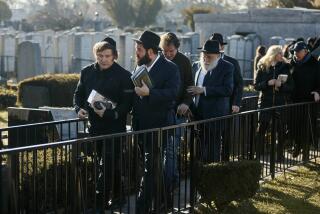Moses Teitelbaum, 91; Rabbi Was Spiritual Leader of Orthodox Sect
- Share via
NEW YORK — Rabbi Moses Teitelbaum, worldwide spiritual leader of tens of thousands of Satmar Hasidim, died Monday at Mount Sinai Hospital in New York City. He was 91.
Teitelbaum, the rebbe, or grand rabbi, of the ultra-Orthodox Jewish sect since 1980, entered the hospital on March 30 and was being treated for spinal cancer and other ailments, community leader Isaac Abraham said.
The question of who will succeed the rebbe as spiritual leader looms large. Two of his sons, Aaron and Zalmen Teitelbaum, have been feuding over that question.
In 2004, a judge in Brooklyn refused to rule in the sons’ dispute over the heir to the Satmar sect, saying that the matter was for the grand rabbi to decide.
Teitelbaum had tabbed Zalmen Teitelbaum to run the congregation in Brooklyn’s Williamsburg and Aaron to take over the congregation in the village of Kiryas Joel, 45 miles northwest of New York City.
But on the larger question of which one should prevail, the grand rabbi remained silent.
“There’s a conflict as to who will be the major head,” said Samuel Heilman, a professor of sociology at Queens College who studies Orthodox Jewish sects. “Not a lot will be changed. As to who will be the dominant one, it will shake out in time.”
Teitelbaum’s group has about 120,000 followers worldwide, said Heilman, with large congregations in Williamsburg and Kiryas Joel. The sect has 65,000 to 75,000 disciples in the United States, 95% of whom live in New York state, said Heilman.
The Satmars emphasize tradition and adhere to a strict dress code -- long skirts for women, long black coats, black hats and long beards for men. Marriages are arranged, and married women must keep their heads covered. The sect takes its name from the town of Satu Mare in what is now Romania.
Sect followers are so single-minded in their devotion to tradition that they even oppose the state of Israel, because they believe that biblically Jewish sovereignty over the ancient land of Israel can come only with the Messiah.
Teitelbaum was born in Siget, in present-day Romania. He escaped Nazi persecution during World War II and came to the United States in 1946. Teitelbaum took over leadership of the Satmar sect from his uncle, Rabbi Joel Teitelbaum, who died childless in 1979 at age 93. He took the formal title of rebbe the following year. The issue of Moses Teitelbaum’s successor is highly charged and sensitive because the job of a grand rabbi is that of “an intermediary between his followers and God,” Heilman said. “He is a father to thousands of people.”
“His blessings carry enormous spiritual and moral value. That’s why the quest for who has the charisma, a combination of office and blood” is so important to Satmars, the professor said.
The grand rabbi also presides over the sect’s schools, camps, a matzo factory and a loan company.
Teitelbaum is survived by four sons, two daughters and dozens of grandchildren.
More to Read
Sign up for Essential California
The most important California stories and recommendations in your inbox every morning.
You may occasionally receive promotional content from the Los Angeles Times.











